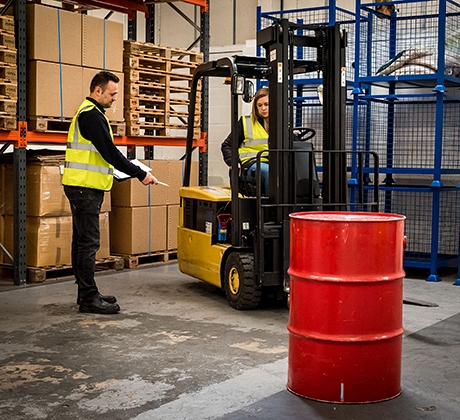It’s vital to ensure that lift truck safety standards are consistently maintained, for the good of your team and your business. Even well-trained lift truck operators need routine monitoring, and, where necessary, retesting or refresher training to ensure bad habits and dangerous practice are not allowed to develop and put your operation at increased risk of an accident.
With no specified forklift refresher period set out by law, choosing the right interval for you requires a sound understanding of your operational risks and how they influence your training schedules.
After all, lift trucks are used in businesses of all types and sizes – but, due to the nature of the work, the environment they operate within, and a host of other variables, some operators may need to complete a forklift refresher course more often than others.
So how do you determine the right frequency? As a starting point, here’s our guidance on creating a policy that’s right for you (and, don’t forget, if you need more help, our expert support team are always on hand to advise)…
What the definitive guide says:
To find out more about refresher frequency, we’ll need to refer to L117, the HSE’s Approved Code of Practice and ‘definitive guide’ to forklift operator training and safe use. It states:
“There is no specific time period after which you need to provide refresher training or formal assessment. However, you may decide that automatic refresher training or a retest after a set period (for example 3-5 years) is the best way to make sure your employees remain competent. Where you adopt this approach, you will still need to monitor performance in case operators need extra training before the set period ends.”
As this is guidance and not law*, some misinterpret refresher training (intentionally or unintentionally) as unnecessary. But it absolutely is, and neglecting this fact could come at a heavy cost to your operation’s safety, compliance and productivity.
(*Though it provides guidance, L117, like any Approved Code of Practice, has special legal status. If followed, you will comply with the law, but if you are prosecuted for a health and safety breach and you didn’t follow its provisions (or demonstrate that you complied with the law in another way), you will be found at fault by the court and at risk of potential prosecution, fines or both.)
Determining your risk level
The next step requires a look at forklift use within your business to apply the guidance. To be truly effective, a refresher training policy should be based on a detailed risk assessment of your specific operations – including your processes and equipment, how and where it’s used, by whom and the associated risks.
Our recent Forklift Safety Insights Report found that over 70% of our survey respondents provided refresher training every 3 years or less. However, 20% of all respondents said they had not completed a risk assessment to specify the frequency of this training, which is essential to ensure it adequately reflects operations and the needs of the team.
A refresher policy alone is not enough
Once established, it’s also important to note that it’s not sufficient to simply implement a regular training interval and assume that this will cover all eventualities. There are instances where refresher training or retesting might be required sooner, if operators:
- Have not used forklift trucks for some time
- Are occasional users
- Appear to have developed unsafe working practices
- Have had an accident, or a near miss
- Have a change to their working practices or environment
As per the above, be sure to consider ‘complacency creep’ when monitoring operational risks. Even the most experienced operators are susceptible to becoming more accepting of increased risks over time as tasks are repeatedly carried out.
Forklift refresher training for long term safety and compliance
Remember, a thorough risk assessment and routine monitoring will help you get refresher training right for your operation but, as with all health and safety policies, the process should not end once it is established, your refresher policy should be regularly reviewed for suitability as operations evolve.
If you need any guidance on forklift training requirements, don’t hesitate to contact us – our expert advisors will be happy to discuss your needs and our accredited, nationwide forklift refresher courses.

